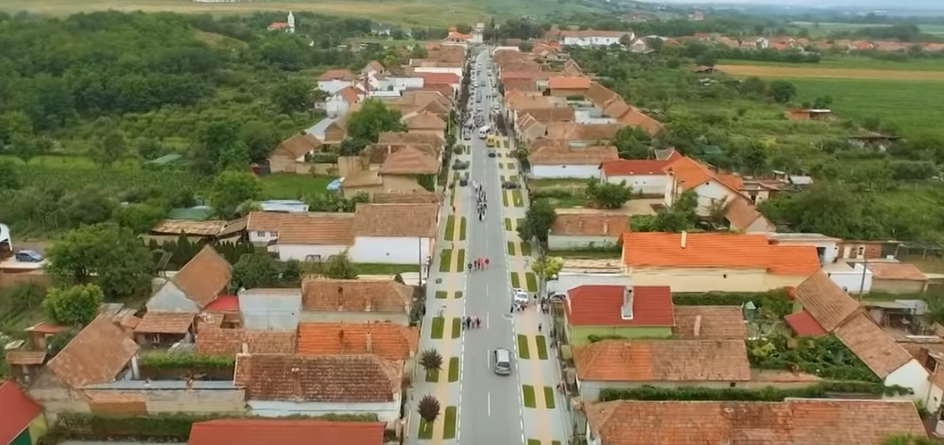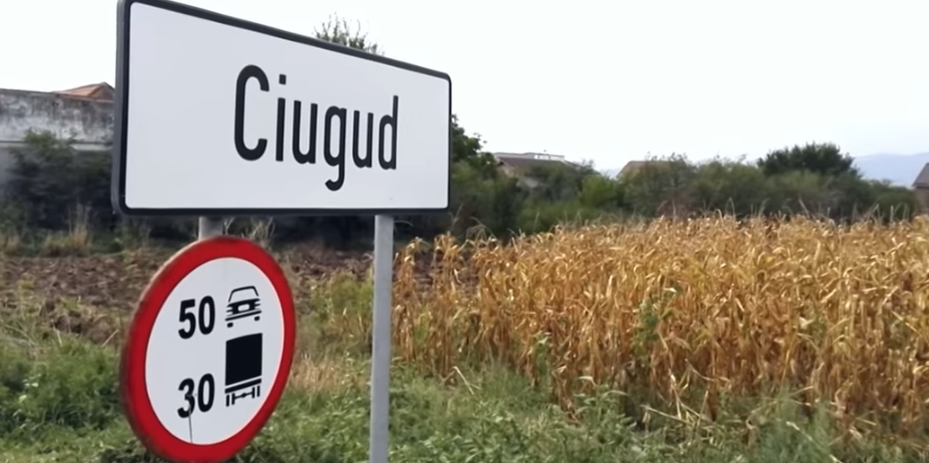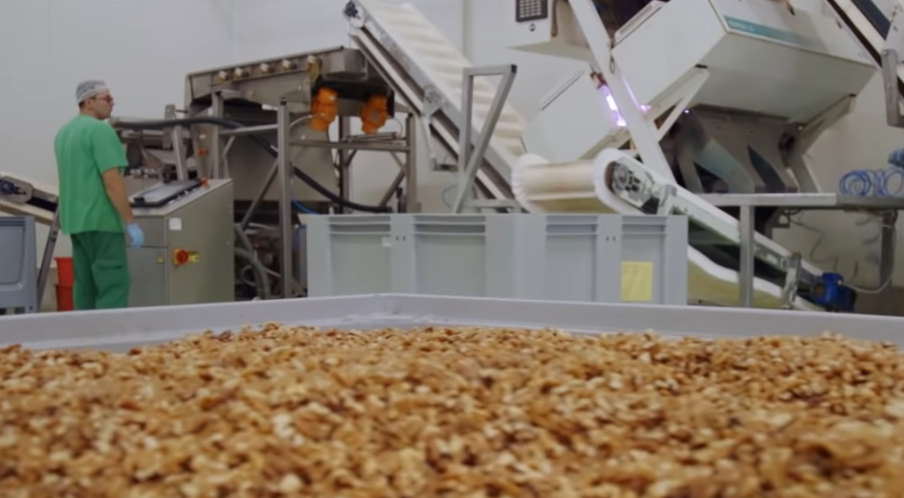Romania: Ciugud, European funds make a difference
Ciugud, in Transylvania, is the Romanian municipality with the most investments per capita in European funds. Let’s discover this phenomenon, in contrast to national data

Romania-Ciugud-i-fondi-europei-fanno-la-differenza
Aerial view of Ciugud - Youtube
Romania is among the European countries with the lowest absorption rate of European funds. Billions of Euros that could have been invested in the development of the country were never requested for projects that could have changed the lives of many Romanians for the better.
At the end of last year, Romania was found to have used only 59% of the European funds that had been made available by the European Commission through the European Structural and Investment Funds in the 2014-2020 period – 19.8 billion Euros against 33.4.
The unspent billions – 14 – are still waiting in Brussels and Romania has time to submit suitable projects to spend them until the end of 2023. These are European funds that come from eight sources including the Cohesion Fund, the European Development Fund regional, the European Social Fund, and the Rural Development Fund.
However, there are also successful projects which have become an actual model. This is the case of the village of Ciugud, about 3000 inhabitants, in the county of Alba, Transylvania. It is considered the most developed village in Romania. Its fame stems largely from the ability to spend European funds well. It is in fact the Romanian municipality with the largest European investments: the credit goes to the local authorities that soon realised what a precious resource they could be.
The first smart school
The first "smart school" ever built in a Romanian village has been active in Ciugud since 2019. It hosts 130 children between elementary and middle schools and there are increasing requests from nearby villages and towns: in a country town that children used to leave in search of a better school ten years earlier.
The current village school is at the forefront thanks to various European funds : the classrooms are automatically illuminated by systems equipped with sensors and adapt so as not to tire the eyes of children. Sensors are also used to regulate the heating, check CO2 levels, ensure ventilation.
In Romania there are still many country schools with a bathroom in the courtyard, without sewers, without heating. In Ciugud, the school toilets have sensors that warn of any flooding. The school systems are managed – both in person and remotely – in order to ensure significant energy savings.
In addition, each student has digital manuals and books, a tablet dedicated exclusively to lessons, and a Cloud space. Furthermore, thanks to cameras in the classrooms, any pupil who is unable to attend school for various reasons can follow classes from a distance.
With European funds, a smart car park was built that produces electricity for both the municipality and electric cars. The municipality itself has one, called "Eli".
Digitisation
Romania became a member of the European Union in 2007. The pre-accession programmes had already given the country the possibility to attract European development funds. The first European funds arrived in Ciugud with a PHARE project – 100,000 Euros invested in software and computers for local public administration. Currently over 80% of the population uses digital tools to pay taxes, obtain services, or receive documents. For five years, all the employees of the municipality have used electronic signatures. The inhabitants have a “citizen’s” card to pay local bills electronically.
To date, Ciugud has attracted over 32 million Euros, around 10,000 Euros per person, compared to a national average of around 1,700. The funds have been spent on infrastructure, tourism, green energy, and cultural projects.
The mayor of Ciugud, Gheorge Damian, elected as independent candidate (but he left the Social Democratic Party in 2017) has led the municipal administration since 2000. In 2000 Ciugud was like many Romanian villages: without running water, sewage, gas, with often dilapidated roads and buildings. Now the roads are paved, waste collection is differentiated, public illumination uses led lights, and consumption is reduced. WiFi is of course free.
New jobs
A village reborn thanks to the local administration and "thanks to the EU", as Mayor Damian says, as without the funds from Brussels the village would have taken over 100 years to accomplish the same investments made in the last period: in 2000, recalls the mayor, on the municipality’s bank accounts there were 15,000 Euros. And the debts amounted to 100,000 Euros.
Meanwhile, in 2004 the municipality di Ciugud also secured long-term funds for over one million Euros per year after promoting an industrial area where dozens of Romanian and foreign companies carry out their activities. In this way, thanks to the investments of the local administration, over 1000 jobs have been created.
Also for this reason, many citizens of the area who had emigrated are returning and there are also people who are moving to Ciugud from the capital Bucharest. Finally, there are those that we could call the "tourists of European funds": in fact, many are visiting the town, now a model for many other Romanian realities in the ability to plan the future thanks to European support.
This content is published in the context of the “Work4Future” project co-financed by the European Union (EU). The EU is in no way responsible for the information or views expressed within the framework of the project. The responsibility for the contents lies solely with OBC Transeuropa. Go to the “Work4Future“
Tag: Work for Future
Featured articles
- Take part in the survey
Romania: Ciugud, European funds make a difference
Ciugud, in Transylvania, is the Romanian municipality with the most investments per capita in European funds. Let’s discover this phenomenon, in contrast to national data

Romania-Ciugud-i-fondi-europei-fanno-la-differenza
Aerial view of Ciugud - Youtube
Romania is among the European countries with the lowest absorption rate of European funds. Billions of Euros that could have been invested in the development of the country were never requested for projects that could have changed the lives of many Romanians for the better.
At the end of last year, Romania was found to have used only 59% of the European funds that had been made available by the European Commission through the European Structural and Investment Funds in the 2014-2020 period – 19.8 billion Euros against 33.4.
The unspent billions – 14 – are still waiting in Brussels and Romania has time to submit suitable projects to spend them until the end of 2023. These are European funds that come from eight sources including the Cohesion Fund, the European Development Fund regional, the European Social Fund, and the Rural Development Fund.
However, there are also successful projects which have become an actual model. This is the case of the village of Ciugud, about 3000 inhabitants, in the county of Alba, Transylvania. It is considered the most developed village in Romania. Its fame stems largely from the ability to spend European funds well. It is in fact the Romanian municipality with the largest European investments: the credit goes to the local authorities that soon realised what a precious resource they could be.
The first smart school
The first "smart school" ever built in a Romanian village has been active in Ciugud since 2019. It hosts 130 children between elementary and middle schools and there are increasing requests from nearby villages and towns: in a country town that children used to leave in search of a better school ten years earlier.
The current village school is at the forefront thanks to various European funds : the classrooms are automatically illuminated by systems equipped with sensors and adapt so as not to tire the eyes of children. Sensors are also used to regulate the heating, check CO2 levels, ensure ventilation.
In Romania there are still many country schools with a bathroom in the courtyard, without sewers, without heating. In Ciugud, the school toilets have sensors that warn of any flooding. The school systems are managed – both in person and remotely – in order to ensure significant energy savings.
In addition, each student has digital manuals and books, a tablet dedicated exclusively to lessons, and a Cloud space. Furthermore, thanks to cameras in the classrooms, any pupil who is unable to attend school for various reasons can follow classes from a distance.
With European funds, a smart car park was built that produces electricity for both the municipality and electric cars. The municipality itself has one, called "Eli".
Digitisation
Romania became a member of the European Union in 2007. The pre-accession programmes had already given the country the possibility to attract European development funds. The first European funds arrived in Ciugud with a PHARE project – 100,000 Euros invested in software and computers for local public administration. Currently over 80% of the population uses digital tools to pay taxes, obtain services, or receive documents. For five years, all the employees of the municipality have used electronic signatures. The inhabitants have a “citizen’s” card to pay local bills electronically.
To date, Ciugud has attracted over 32 million Euros, around 10,000 Euros per person, compared to a national average of around 1,700. The funds have been spent on infrastructure, tourism, green energy, and cultural projects.
The mayor of Ciugud, Gheorge Damian, elected as independent candidate (but he left the Social Democratic Party in 2017) has led the municipal administration since 2000. In 2000 Ciugud was like many Romanian villages: without running water, sewage, gas, with often dilapidated roads and buildings. Now the roads are paved, waste collection is differentiated, public illumination uses led lights, and consumption is reduced. WiFi is of course free.
New jobs
A village reborn thanks to the local administration and "thanks to the EU", as Mayor Damian says, as without the funds from Brussels the village would have taken over 100 years to accomplish the same investments made in the last period: in 2000, recalls the mayor, on the municipality’s bank accounts there were 15,000 Euros. And the debts amounted to 100,000 Euros.
Meanwhile, in 2004 the municipality di Ciugud also secured long-term funds for over one million Euros per year after promoting an industrial area where dozens of Romanian and foreign companies carry out their activities. In this way, thanks to the investments of the local administration, over 1000 jobs have been created.
Also for this reason, many citizens of the area who had emigrated are returning and there are also people who are moving to Ciugud from the capital Bucharest. Finally, there are those that we could call the "tourists of European funds": in fact, many are visiting the town, now a model for many other Romanian realities in the ability to plan the future thanks to European support.
This content is published in the context of the “Work4Future” project co-financed by the European Union (EU). The EU is in no way responsible for the information or views expressed within the framework of the project. The responsibility for the contents lies solely with OBC Transeuropa. Go to the “Work4Future“
Tag: Work for Future












